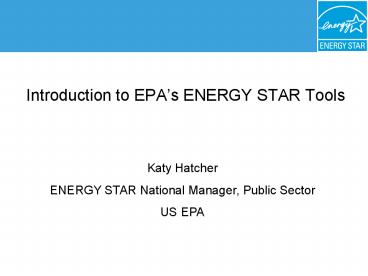Introduction to EPA - PowerPoint PPT Presentation
1 / 17
Title:
Introduction to EPA
Description:
Westin San Francisco Airport. Millbrae, CA. LL&E Tower. New Orleans, LA ... Full-service hotels that improve energy efficiency by 10 percent see an ... – PowerPoint PPT presentation
Number of Views:61
Avg rating:3.0/5.0
Title: Introduction to EPA
1
Title
- Introduction to EPAs ENERGY STAR Tools
Katy Hatcher ENERGY STAR National Manager, Public
Sector US EPA
2
What is ENERGY STAR for Buildings?
- U.S. Environmental Protection Agency energy
management program providing proven solutions to
help public and private sector building owners
and managers reduce their energy consumption.. - Provides proven solutions to help public and
private sector building owners and managers
reduce their energy consumption. - Works in markets with a focus on
- Public sector (government, K-12, higher ed)
- Commercial property (offices, retail, hotels)
- Healthcare
- Small business and congregations
3
Also ENERGY STAR
LLE Tower New Orleans, LA
Westin San Francisco Airport Millbrae, CA
4
What is ENERGY STAR for Buildings?
- Thousands of Partners operating more than 11
billion square feet of space (nearly 20 of space
in the U.S.). - Over 70,000 buildings measure and track their
energy performance, energy costs, and carbon
emissions with ENERGY STAR.
5
What is ENERGY STAR for Buildings?
- National and Local Recognition
- ENERGY STAR Partner
- Designed to Earn the
- ENERGY STAR
- ENERGY STAR Label
- ENERGY STAR Leader
- ENERGY STAR Partner of the Year
6
Why Energy Efficiency in Commercial Buildings?
- The buildings in which we work, shop, play, and
educate our children use 200 billion of
electricity and natural gas each year. - Commercial buildings and industrial facilities
generate nearly 50 of U.S. carbon dioxide
emissions. - 30 of energy consumed in commercial buildings is
used unnecessarily or inefficiently. - According to the U.S. Green Building Council, GHG
emissions from commercial buildings are projected
to grow faster than any other sector over the
next 25 years about 1.8 percent per year. - IMMEDIATE, LOW-COST emission reduction
opportunities for cities EXISTING city and
private sector buildings.
7
Benefits of Energy Efficiency in Commercial
Buildings - Financial
- Leading companies realize that energy efficiency
can have a high return-on-investment and is
necessary in order to remain competitive. - Businesses and organizations that are leaders in
energy efficiency use about 30 percent less
energy than their competitors. - Financial benefits of energy efficiency include
- Buildings that have earned the ENERGY STAR save
more than 50 cents per square foot than average
buildings and more than 2 per square foot than
inefficient buildings. - Commercial properties may increase net operating
income and building asset value by 5 percent. - Corporate real estate owners can lower operating
costs by 25,000 per year for every 50,000 square
feet of typical office space. - Full-service hotels that improve energy
efficiency by 10 percent see an increased average
daily rate of 1.35. - By reducing energy costs by just 5 percent,
for-profit hospitals can increase earnings by one
penny per share.
8
What is ENERGY STAR for Buildings?
- Free technical resources
- Tools to benchmark and track energy performance
in buildings - Energy Management Guidelines
- Assistance for architects on designing energy
efficient buildings - Case studies and best practices from leaders
- Calculators to track returns on energy efficiency
investments - Training
- Materials to communicate with citizens,
employees, stakeholders, and the media about
energy efficiency efforts.
9
The ENERGY STAR Approach
ENERGY STAR Energy Management Guideliness a
commitment to continuous energy performance
improvement.
10
ENERGY STAR Teaming Guide
- How-to guide on building an energy management
team - Teaming up to Save Energy Checklist
- Organizing your energy team
- Starting your energy program
- Building capacity
- Sustaining the team
- Maintaining momentum
11
Is Your Building Performing Well?
Is 80 kBtu/SF/YR high or low for a building?
Energy Performance EPA Benchmarking
Fuel Efficiency MPG
Is 18 MPG high or low for an automobile?
12
New Doesnt Always Equal Efficient
13
Technology Doesnt Guarantee High Performance
100
75
50
ENERGY STAR
1999 - 2001
25
61.4 kBtu/ft2/yr
0
CBECS
VAV
VSDs
EMS
Bottom 25
226.3 kBtu/ft2/yr
Economizer
Energy Audit
Motion Sensors
Note CBECS is the Energy Information
Administrations Commercial Building Energy
Consumption Survey, http//www.eia.doe.gov/emeu/cb
ecs/contents.html
14
Portfolio Manager Helping You Track Your
Performance
- Free online tool where you can
- Benchmark the energy use of all of your buildings
all will receive an EUI (energy use intensity)
and some will receive ratings on a 1-100 scale. - Track changes in energy use over time in single
buildings, groups of buildings, or entire
portfolios. - Track cost savings and CO2 emissions.
- Apply for ENERGY STAR recognition.
- Track water usage.
- Free on-line live trainings offered monthly.
- http//www.energystar.gov/benchmark
- Louisville-Jefferson County Metro government
currently initiating benchmarking of all city
buildings with Portfolio Manager.
15
Tracking Campaigns Master Accounts
- Objective Allows organizations to track progress
of campaigns, for example - MD can track buildings across agencies
- Energy saving competitions among buildings and
agencies - Process
- MD creates a Master Account
- Master Account appears in a public registry
- Individual users can share facilities with Master
Account - Master Account holder can view progress for all
facilities that have been shared
16
Seattle BOMA Kilowatt Crackdown
- Promoting leadership in energy efficient
building operations. - Participants will benchmark their buildings in
Portfolio Manager by 1/25/2008 using 2007 utility
data. - Winners receive cash prizes, and those qualifying
for the ENERGY STAR label received free
engineering certification. - Prizes include a private suite party at a Seattle
Mariners game, tickets to the BOMA golf
tournament, and a catered lunch for 12.
17
ENERGY STAR Contacts
- www.energystar.gov
- Katy Hatcher
- ENERGY STAR National Manager, Public Sector
- Hatcher.Caterina_at_epa.gov
- Leslie Cook
- The Cadmus Group, Inc.
- 703-247-6148, lcook_at_cadmusgroup.com































